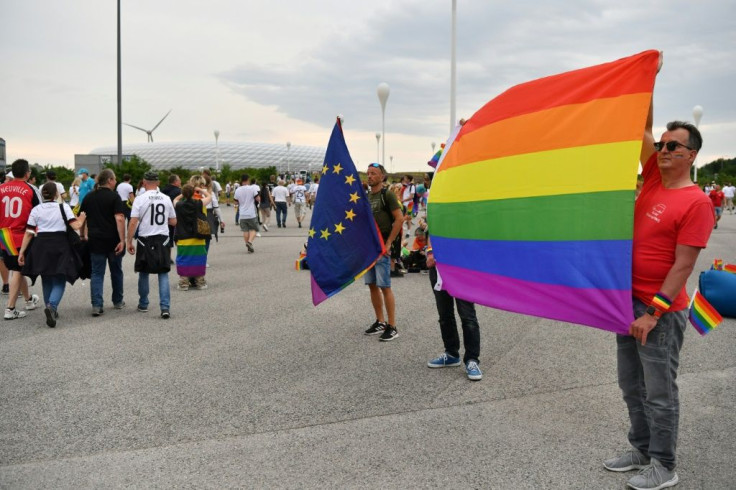Hungary LGBTQ Law Wrangle Blows EU Summit Off Course
Controversy over a new Hungarian law banning LGBTQ references in school materials is threatening to overshadow an EU summit on Thursday and Friday intended to focus on foreign policy issues: confronting Russia and tricky ties with Turkey.
The geopolitical tone of the Brussels meeting was set in advance with UN chief Antonio Guterres sitting in at the start on Thursday for an extended working lunch with EU leaders before tackling a range of foreign affairs.
But an EU official said the burgeoning debate about Hungary's law had become "quite important" and would likely be raised during the first day's working dinner.
That issue pushed to the forefront of EU politics this week when UEFA, Europe's football governing body, rejected a plan by Munich to light up its stadium in LGBTQ rainbow colours for a Germany-Hungary match on Wednesday.
The city reacted by instead decorating many of its monuments -- including those next to the stadium -- in rainbow tints while French President Emmanuel Macron said UEFA's decision was deeply regrettable.
Hungary's right-wing Prime Minister Viktor Orban -- long the bete noire of Brussels for his socially conservative policies seen undercutting EU democratic norms -- is guaranteed a frosty welcome at this summit.
German Chancellor Angela Merkel has called his government's law "wrong" while European Commission chief Ursula von der Leyen branded the legislation "a shame" -- running counter to fundamental EU values and whose legal basis her executive would challenge.
"This bill clearly discriminates against people on the basis of their sexual orientation," von der Leyen said.
More than half the EU countries, including heavyweights Germany, France, Italy and Spain, have signed a joint declaration voicing "grave concerns" over the Hungarian law and calling for the commission to act.
The speaker of the European Parliament, David Sassoli, upped the ante with a letter to the commission demanding immediate activation of a mechanism making pay-outs to Hungary from a common EU pot of money for Covid recovery conditional on it upholding the rule of law.
Hungary has defiantly hit back at all criticism over the LGTBQ legislation adopted on June 15 and which is due to come into effect soon.

Orban's government on Wednesday accused von der Leyen of making "false allegations" and her commission offering "biased political opinion" on the subject.
It asserts that the law "protects the rights of children" and denies it is discriminatory.
A senior EU official said: "With Hungary, this is maybe the worst (situation), to be honest, I have personally seen. But in the past he (Orban) has also taken a step back from legislation the government proposed. So let's hope this is swiftly removed as well."
The furore is to be slotted in alongside other, longer-simmering problems EU leaders have been grappling with.
One of those is Russia, the EU's vast eastern neighbour that is a significant supplier of energy but also seen as an increasing threat.
EU foreign policy chief Josep Borrell warned last week that the bloc's ties with Moscow look set to get worse despite already reaching "the lowest level".
Leaders are set to discuss ways to keep Russia in check while engaging it on key issues -- but there are splits within the 27 member states.
Germany and France put forward a last-minute proposal for their counterparts to consider holding a summit with Russian leader Vladimir Putin after US President Joe Biden met him in Geneva.
The push faces opposition from numerous EU nations -- particularly in eastern Europe -- wary of talking to the Kremlin.
Turkey, too, figures on the agenda. The European Commission is pitching a proposal to provide 3.5 billion euros ($4.2 billion) to Ankara over the next three years as part of a bigger, 5.7-billion-euro package of support to countries hosting refugees from Syria's interminable civil war.
The additional funding is seen as a major incentive to Turkish President Recep Tayyip Erdogan to stick to efforts aimed at tackling long-running disputes with Greece and cease controversial gas exploration in the waters around Cyprus.
A previous 2016 deal under which Turkey has so far received four-billion-euros to prevent migrants crossing to the EU through Greece and Bulgaria is key to EU strategy as it tries to overcome internal divisions to rework its rules on how irregular migrants are processed and hosted.
© Copyright AFP {{Year}}. All rights reserved.




















